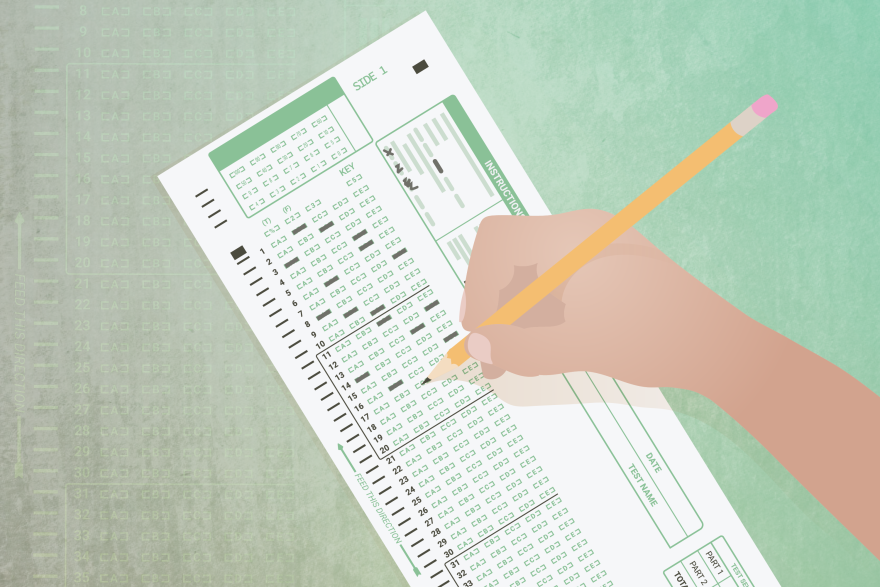Missouri education officials released long-awaited school report cards Friday, and the good news is most schools are meeting expectations.
In fact, 97 percent of public schools scored in the fully accredited range, including Kansas City, Hickman Mills and Riverview Gardens — all districts trying to regain accreditation.
At the same time, fewer than half of public school students in Missouri passed the new, more rigorous math and English tests they took last spring.
So which is it? Are the vast majority of Missouri schools doing great, or are they falling short of state expectations?
“We don’t know,” said Susan Pendergrass, a former senior policy advisor for the U.S. Education Department who now works for the libertarian Show-Me Institute. “There’s no way for a parent to know if their school is not performing well, because basically parents are being told, ‘Don’t worry, every school is fine.’”
Mystery pie
Compared to the way other states report how their schools are doing, Pendergrass thinks Missouri’s system is “pretty confusing, even as an education researcher.”
She said the number 70 resonates with people, but she doubts most parents get that schools need 70 percent of available points on their Annual Performance Report, not 70 points out of 100.
The Annual Performance Report, or APR, is a school report card the state Department of Elementary and Secondary Education publishes. It’s the largest factor in how the state Board of Education determined accreditation for school districts. (Charter schools receive an APR but are not given an accreditation label by the state school board.)
Matt Goodman, an administrator with the Pattonville School District, tells parents to think of APR as a pie with five slices.
But not five equal slices.
“The first two are student-performance areas, and they equate for half of the pie,” Goodman said. “It’s a substantial part.”
Graduation rates, college and career readiness and attendance are smaller slivers. It’s not a great analogy, but it’s what Missouri school administrators have to explain how they’re doing to parents.
Time to move on?
It doesn’t help that the state has cycled through four different tests in five years.
“All of that is behind us now,” newly reinstated Education Commissioner Margie Vandeven said last month. “I'm very hopeful that now that we have our Missouri standards in place with Missouri tests, that there will be a level of stability.”
About 48 percent of third through eighth graders scored proficient or advanced on the English exam. Just over 40 percent of those students did as well on the math portion.
“We are all incredibly focused on making sure that we continue to develop our math and literacy skills from our earliest years,” Vandeven told reporters this week.
Yet last year’s test results are not comparable with those from previous years, the department has warned.
Vandeven has said that stability is coming. The math and English tests Missouri students will take this spring will be the same as last year. Still, schools waited months longer than they usually do for those scores.
Karol Howard, an elementary school principal in Kansas City, said her teachers have had to move on.
“My teachers don’t care a bit about a delay,” she said. “They’ve got different kids.”
A lot of school superintendents are frustrated and think there’s a better way. They’ve formed the Missouri Assessment Partnership to advocate for better tests.
Missouri's current scoring system gives more credit to schools where students pass the test each year versus schools where students have made substantial gains over previous years but still came up short on the test.
That can hurt low-income schools where kids bounce from school to school because of unstable housing and often enter those schools years below grade level.
Charter school advocates also cry foul over the rubric because they are not able to receive all available points as they phase in grade levels, sometimes resulting in significantly low scores
State education officials are working on the first major overhaul of its school-accountability program since 2012, a process that was delayed by then-Gov. Eric Greitens’ meddling with the state school board and firing Vandeven.
Until those changes are made, schools that are reaching the maximum number of points on their report cards should be looking to improve in other areas, according to Assistant Education Commissioner Chris Neale.
“I hope this is not the entire scope of what a school bases its goals and its direction of improvement on,” he said.
As parents and schools digest these test results, high-school students will begin sitting down to the 2019 test in a little more than two weeks.
Follow Elle and Ryan on Twitter: @ellemoxley; @rpatrickdelaney
Send questions and comments about this story to feedback@stlpublicradio.org
Send questions and comments about this story to feedback@stlpublicradio.org.
Support Local Journalism
St. Louis Public Radio is a non-profit, member-supported, public media organization. Help ensure this news service remains strong and accessible to all with your contribution today.



